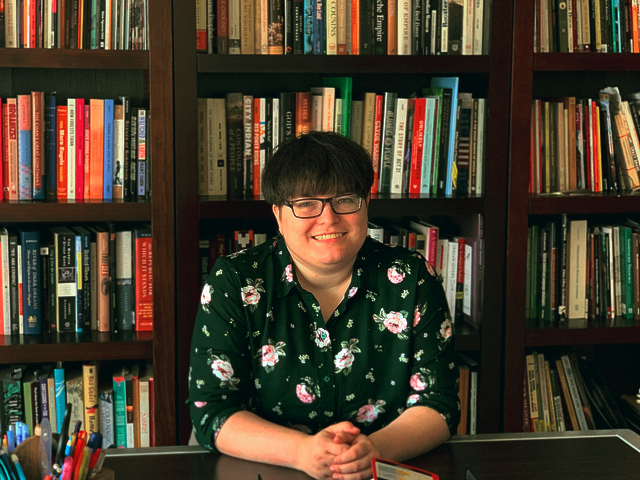Graduating with a degree in First Nation Studies in 2016, Kai is now a PhD candidate in American Studies at the University of Minnesota-Twin Cities. Kai is writing their dissertation on LGBTQ history within their tribe, the Anishinaabe nation, and is a teaching assistant.
Why did you decide to major in First Nation Studies? I didn’t start out at UWGB—the first class I ever took there was while on medical leave from the University of Chicago. I figured while I was home in Green Bay, I might as well take a class at the university, so I signed up for a First Nations Studies course with Dr. J P Leary on Indigenous oral traditions and storytelling. The things I learned from that class and the relationships I built with the department and other Native students on campus had me convinced by the end of the semester that I needed to transfer in order to major in First Nations Studies, and I’m so glad I did.
What academic experience or accomplishment are you most proud of? In the spring of 2015, I had the opportunity to participate in a number of presentations at conferences and universities alongside my peers and mentors in the First Nations Studies department. At the Wisconsin Indian Education Association conference, my peers and I not only held a presenter session on the work we had done in my first class on oral traditions, but also were given the opportunity by Dr. Lisa Poupart to participate as co-presenters of the keynote on the theme of “Indigenous education in practice.” That same semester, Dr. Poupart took several of us along to present at Northern Michigan University on the importance of First Nations Studies and Gender Studies. Having these experiences as an undergraduate really built my confidence for when I moved into graduate school, and I am incredibly grateful to Dr. Poupart and Dr. Leary for giving me those opportunities.
What is an important goal or accomplishment you are currently working on? Right now I am working as a long-distance research assistant for the Canada-based organization Prairies to Woodlands Indigenous Language Revitalization Circle. We’re working to create a digital dictionary for the Michif language, which is one of my heritage languages. There aren’t very many resources available for people who want to learn Michif, and I’ve been involved with trying to improve that situation for years now. We’re planning to have an initial version done by early 2020, and I’m very excited to see the final product!
What do you do for fun? In addition to my academic work, I’m also a creative writer. I write mostly poetry and creative nonfiction, but I also have my first short story coming out in an anthology of LGBTQ Indigenous science fiction in the next year. Creative writing is something I’ve been doing my whole life, practically—it’s really the way that I process my thoughts and emotions. You can find links to some of my writing, both creative and scholarly, on my website, http://mekadebinesikwe.com.
What else do you want people to know about you? My identities as a transgender and disabled, mentally ill, and autistic person are very important to me, especially since you rarely see trans and disabled Native people represented anywhere, much less in academia. I want anyone out there who shares those identities to know that we can do whatever we aspire to, and that our achievements matter immensely.
